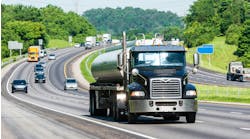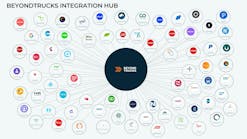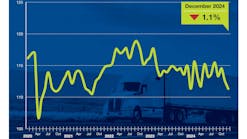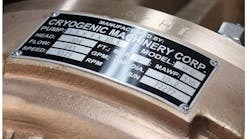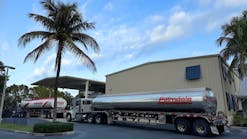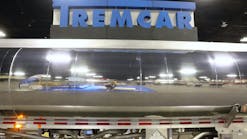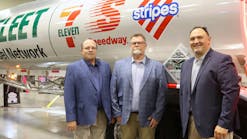What Dow Chemical looks for in logistics, transport providers
A question frequently asked of The Dow Chemical Company's Global Supply Chain personnel: “What is the elusive ‘Dow Prep’? It's not on your website. It's not on Google.”
Lori Pavlish, who heads Global Supply Chain Environment, Health, and Safety (EHS) and Compliance at Dow, said the requirement is “clean, dry, odor-free, and leak-free.” She discussed the Dow Chemical program during the 1012 Intermodal Bulk Liquid Symposium in Kemah, Texas.
Pavlish said that as a result of meeting with Dow's core carriers, the company started analyzing how many times people were climbing up and down transportation equipment. Dow found out that sealing issues were among the biggest issues that caused workers to climb on tank trailers and ISO tank containers.
So in 2011, Dow North America adopted the requirement that all equipment offered to its facilities for loading must arrive clean, dry, odor-free, leak-free, and with all operable equipment openings sealed in the closed position.
The purpose was to minimize the number of times various workers in the transport process need to work above grade (eg, tank cleaning, tank preparation, inbound inspection, loading/ unloading, outbound inspection); and reduce leaks from cleanout caps and other operable openings on transportation equipment.
Dow needs equipment that can be fully sealed, and can accommodate high security seals (at least 1/8" thick).
“Sometimes containers come in but can't accommodate the 1/8"-thick security seal,” she said. “That is an issue with us.”
Here's how companies can learn Dow's equipment specifications, particularly for material construction:
- www.dow.com: Material-handling guidelines and material safety data sheets.
- Dow's 3PL web-board. To request access, contact your Dow sponsor, and submit a request to Dow functional mailbox [email protected]. Specifically, request access to web-board Section 27 (Bulk Handling Requirements-Marine) and Section 28 (Bulk Handling Requirements-Terminals).
She said Dow Purchasing looks for suppliers that:
- Demonstrate a commitment to reliable, high-quality supply relationships.
- Have the capability to provide unique solutions, services, and raw materials to support innovation.
- Collaborate with Dow to drive competitive advantage and product performance through differentiation.
- Join Dow in efforts to set the standard for sustainability and embody highly responsible, ethical business practices, including sustainable labor practices. “This is a core value. It's one of the things we advertise but also live.”
- Dow Purchasing is the conduit for suppliers to tap into significant opportunities. Its supplier expectations include: global presence — or local superiority — to support strategic geographies and a broad variety of needs; consistency in supply, service, and quality, as well as participation in responsible care; innovation; and green alternatives.
Sustainability initiatives:
- American Chemistry Council Responsible Care Partner Program. “This is a huge effort. We have criteria, and a score is assigned to potential logistics providers. Half of that is whether they are part of the ACC program.”
- US EPA SmartWay. Launched in 2004, SmartWay is an EPA program that reduces transportation-related emissions by creating incentives to improve supply chain fuel efficiency. “We've seen tremendous success from logistics partners who are participating.”
- SmartWay Drayage Carriers Program.
- C-TPAT: Customs-Trade Partnership Against Terrorism. C-TPAT seeks to safeguard the world's vibrant trade industry from terrorists, maintaining the economic health of the US and its neighbors. The partnership develops and adopts measures that add security but do not have a chilling effect on trade, a difficult balancing act. Begun in November 2001 with just seven major importers as members, as of June 2011, the partnership has grown. Today, more than 10,000 certified partners that span the gamut of the trade community have been accepted into the program. These include US importers, US/Canada highway carriers; US/Mexico highway carriers; rail and sea carriers; licensed US Customs brokers; US marine port authority/terminal operators; US freight consolidators; ocean transportation intermediaries and non-operating common carriers; Mexican and Canadian manufacturers; and Mexican long-haul carriers. These 10,000-plus companies account for over 50% (by value) of what is imported into the United States. Dow Chemical is a Tier 3 (highest level) C-TPAT Partner.
- CEFIC: The European Chemical Industry Council.
- SQAS: Safety and Quality Assessment Systems www.sqas.org.
- CDI: International Marine Packed Cargo Audit Scheme.
- IMPCAS: www.impcas.org.
- Cargo Tank Risk Management Committee: CTRMC. www.cargotanksafety.org.
“Falls continue to plague our industry,” she said. “It's not unique to just one market segment. Everybody's affected by this. Go to our website and you can download the falls protocol and trailer climbing training guide. Many people say they train, but when we ask them, they don't have anything.”
She said Dow has been asked what it considers to be some of the best practices it sees among its logistics service provider (LSP) community.
- Keep the five characteristics of a highly reliable organization in mind when planning/performing work; expect the unexpected (preoccupation with failure); do not generalize (reluctance to simplify interpretations); identify trends and anticipate impact (sensitivity to operations); commitment to resilience; engage and apply expertise (deference to expertise).
- Have leaders who set high expectations for their organizations. “This is what drives the success of a business. I can pretty much walk into a facility and tell if the leader believes. Either they believe or they don't. To me, there's nothing more important. I know if you're operating safely, everything else will follow. But it starts with the leaders.”
- Maintain employee selection/qualification criteria and programs, including requirements for other LSPs with whom they contract or sub-contract.
- Conduct initial and reoccurring training.
- Establish effective operating discipline for performing work consistently and safely. “That doesn't mean spanking people if they make a mistake. It means having a right way to do things.”
- Maintain and follow effective Management of Change work processes.
- Establish trend analysis/work processes to identify conditions that could lead to failures.
- Conduct self-assessments, and participate in third-party assessments to confirm that approved work processes and procedures are being followed. “You can't fix things if you don't understand them.”
- Maintain effective incident reporting and follow-up work processes, with an emphasis on developing effective corrective/preventative actions.
- Provide suitable transportation equipment (including effective mechanical integrity/preventative maintenance programs and compatible materials of construction).
- Validate that robust incident response capability is in place to minimize the impact of unplanned safety/ security events.
- Every participant in the supply chain must lead by example: by words and by actions, seek opportunities to reinforce high safety values with all members of the organization.
- The right personal protective equipment (PPE) for the job must be worn correctly 100% of the time. Intervene if it is not. “Do it in a positive way. You don't have to be obnoxious. Just let them know it matters.”
- Ensure that fall protection is available and is used by logistics service providers as needed.
- During safety meetings and interactions with carrier team members, reinforce the message that although Dow values on-time deliveries, the safe delivery of products is the top priority 100% of the time.
- Follow procedures/ checklists for transportation container inspection prior to loading/unloading, and adhere to approved securement methodologies. Emphasize and conduct self-assessments of pre-trip inspections of bulk transport containers, package trailers and intermodal containers. Document equipment rejections so that follow-up is to be done with the responsible parties. Train personnel on inspection/ rejection criteria.
- Do not hesitate to report problems or potential problems to Dow representatives. “We depend on our professional logistics service providers to tell us if there may be a problem with securement or a loading pattern.”
- Review/ evaluate work processes for order handling and document creation; look for potential scenarios where data-entry errors could lead to operational errors. ♦

